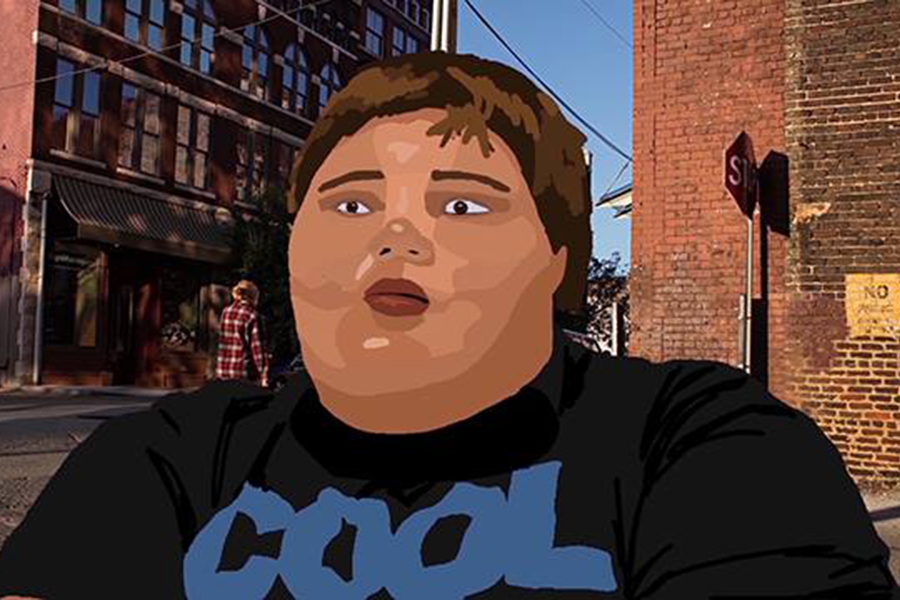John Serpentelli can trace the origins of his new project “Came Out/Kicked Out” all the way back to 1992.
“I graduated from Penn, and I was working at the Roxy movie theater. I was making the popcorn and sweeping it up at the end of the night. Finally, I said to myself, ‘This can’t be my life,’” he recalled. “So I did what I think everyone should sometimes do and asked myself what I would do if I could do anything. And I wanted to make animated films for children.”
So Serpentelli worked up the courage to call a local children’s art organization, where it just so happened the school’s animation teacher had just walked out, leaving a major animation education grant available. Serpentelli described that day as fate calling his name. Before he knew it, he was on his way to 12th and Allegheny to teach the students in a correctional school for girls who had committed weapons offenses how to make movies.
“I’d never taught before, and I didn’t know what I was doing. I was terrified, but I just walked in and started teaching,” Serpentelli said. “I never had a single problem because I treated the girls with respect.”
Together, Serpentelli and his class created “Some Girls in the Hood,” which would go on to screen at festivals, win accolades and garner attention from PBS producers.
“It’s all because ‘Some Girls’ was real and it was true. And ever since that film, I’ve known that’s what I wanted to do,” Serpentelli said. “I just want to be a conduit for people who don’t have a voice, so they can be as real as possible without being judged.”
Serpentelli’s animated shorts have permeated public TV for over 20 years, including features on HBO Family, Nick Jr. and a Romare Breaden-inspired anti-smoking commercial. His latest project is an ambitious series of animated short films titled “Came Out/Kicked Out” — he originally planned to call it “From Homeless to Hopeful” — which depicts the first-person stories of homeless LGBT youth.
“[‘Came Out/Kicked Out’] sort of happened a bit by accident. Initially, I was focusing on homeless people through One Step Away. I interviewed three people but I didn’t have enough money to make three films,” Serpentelli said. “I chose Cadence’s story because I was so moved by it, how daring and brave Cadence must have been to embrace that identity at such a young age. And how Cadence found making comics for One Step Away helped him find his voice. I felt that was quite a story that hasn’t been heard before.”
Cadence Reiner was 24 when he recorded his life story for Serpentelli, describing an abusive home in the Midwest and an escape to Philadelphia that left him and his partner homeless for a period.
In the film, Cadence says, “Philadelphia’s a really scary place to be homeless in.” But he found refuge and self-respect in creating a popular comic strip for the street newspaper One Step Away.
“I get people, one or two every week, who are like, ‘You do that comic? I love that comic!’” Cadence describes in the film. “One lady even told me she cuts out my comic every week. I feel proud of myself. My parents tried to subdue my voice, but I found it again.”
“When I decided to do the second film,” Serpentelli noted, “I knew I wanted to continue exploring the lives of LGBTQ youth facing homelessness.”
The National Coalition for the Homeless estimates that 20 percent of all homeless youth identify as LGBTQ, and family conflict and rejection is the leading cause of their homelessness. Another study by the William Institute suggests that up to 40 percent of homeless young people identify as LGBTQ. Homelessness, particularly over a long period, leaves young people open to violence, sexual exploitation and addiction.
Now, Serpentelli is raising funds through a Generosity campaign to make the next installment in “Came Out/Kicked Out,” featuring the story of local transgender activist Hazel Edwards.
“Hopefully we’ll raise enough money that we can interview her and record Hazel in a sound booth, and she can tell her story freely,” Serpentelli said. “Hazel is a mature person with a great sense of humor and a lot to say. I can’t wait to work with her again.”
Serpentelli believes that animation is the perfect way to tell these stories because it allows flexibility and creativity that the traditional documentary format doesn’t permit.
“This generation is so media-savvy. You don’t need to make it simple. These lives are complex. So why not let the animation be complex?” Serpentelli said.
“[‘Came Out/Kicked Out’] isn’t a corporate viewpoint or a public-service announcement. This is real life. The purpose is to make it feel as real as possible. You have to do all you can to honor that person’s voice and the depth of their vision and the depth of their story.”
In this time, when LGBT rights and funding for the social- safety net stands poised for dangerously deep cuts, Serpentelli is eager to keep telling the true stories of LGBT at-risk youth.
“I want young, transgender people to see these films, so they see there are others like them, going through these struggles and still making an impact. But also, I want people who don’t understand or are mystified by LGBTQ people to watch these films and maybe be enlightened.”
